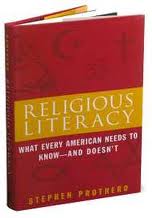Should We Teach Religion in the Public Schools?

February 18, 2013
 Here’s a question that produces opinionated answers. Stephen Prothero, in his book Religious Literacy, thinks we should. But it isn’t for the reason most would assume.
First, there are those that think that we need to bring prayer and daily Bible reading back into the public schools. After all, public school was instituted as a way to spread literacy so that everyone could read their Bibles for themselves. The first textbooks taught religious knowledge alongside of ABC’s and arithmetic. Nowadays we use simple words like “apple”, “ball”, and “cake” to teach the ABC’s, but the best-selling American schoolbook for over a century taught this way:
Here’s a question that produces opinionated answers. Stephen Prothero, in his book Religious Literacy, thinks we should. But it isn’t for the reason most would assume.
First, there are those that think that we need to bring prayer and daily Bible reading back into the public schools. After all, public school was instituted as a way to spread literacy so that everyone could read their Bibles for themselves. The first textbooks taught religious knowledge alongside of ABC’s and arithmetic. Nowadays we use simple words like “apple”, “ball”, and “cake” to teach the ABC’s, but the best-selling American schoolbook for over a century taught this way:
A In Adam’s Fall We sinned all.B Heaven to find; The Bible Mind.C Christ crucify’d For sinners dy’d (72).Early America used textbooks such as this New England Primer, Webster’s Speller, and McGuffey Readers to pump out good little, learned Calvinists. American children were gaining protestant theology along with their education. But we are a much more diverse country now. And do I really want my children to learn theology from their English teacher? Do I think that it is the commission of public school teachers to preach the gospel? I don’t want my children learning about something like the providence of God from their math teacher anymore than I want them learning Algebra from our pastor. But this isn’t the plea that Prothero is making either. His “agenda is not religious. It is civic and secular” (15). Prothero introduces his book exposing the complete lack of religious literacy by Americans today. He defines religious literacy as “the ability to understand and use in one’s day-to-day life the basic building blocks of religious traditions—their key terms, symbols, doctrines, practices, sayings, characters, metaphors, and narratives” (12). You see, he doesn’t just think that Christianity is an important religion to teach in the public schools, since there are more professing “Christians in the United States today than there have been in any other country in the history of the world” (12), but Prothero explains the importance of Americans having knowledge of all religious beliefs.
To understand foreign policy in Tibet, for example, one needs to know something about Buddhist monasticism and the Dalai Lama. To follow the ramifications of the “under God” language in the Pledge of Allegiance, one needs to know about the nuances of both atheism and polytheism. And to fully engage in debates about the war in Iraq, one needs to be informed about jihad and the Islamic tradition of martyrdom…The war on terrorism, is to a great extent—a far greater extent than most American politicians recognize—a war of ideas. To wage that war, one needs to be equipped with ideas—to understand, among other things, the religious underpinnings of Osama bin Laden’s strategy to engage “the crusader-Zionist alliance” in a clash of civilizations (13).And Prothero does undress the situation for us on how little most Americans know even about the popular faith that they profess to follow. Here is a small sample of the astonishing condition he reports we are in:
- Only half of American adults can name even one of the four Gospels.
- Most Americans cannot name the first book of the Bible.
- Only one-third know that Jesus (no, not Billy Graham) delivered the Sermon on the Mount.
- A majority of Americans wrongly believe that the Bible says that Jesus was born in Jerusalem.
- When asked whether the New Testament book of Acts is in the Old Testament, one quarter of Americans say yes. More than a third say that they don’t know.
- Most Americans don’t know that Jonah is a book in the Bible.
- Ten percent of Americans believed that Joan of Arc was Noah’s wife (30).




